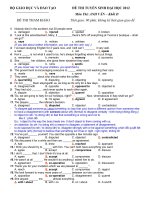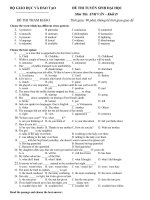Luyện thi ĐH môn Anh văn khối D - Chương trình mới Đề số 17 ppsx
Bạn đang xem bản rút gọn của tài liệu. Xem và tải ngay bản đầy đủ của tài liệu tại đây (65.57 KB, 3 trang )
Luyện thi ĐH môn Anh văn khối D - Chương trình mới
Đề số 17
I. Make the correct choice:
1.Choose the word whose underlined part is pronounced differently from the others:
a. shake b. know c. snake d. look
2.Choose the word whose underlined part is pronounced differently from the others:
a. dance b. attendance c. chance d. glance
3.Choose the word whose underlined part is pronounced differently from the others:
a. placed b. advised c. raised d. changed
4.Choose the word whose underlined part is pronounced differently from the others:
a. militant b. accountant c. constantly d. grant
5.Choose the word whose underlined part is pronounced differently from the others:
a. friends b. answers c. moments d. doors
6. Choose the word whose main stress is placed differently from the others:
a.commitment b. environment c. habitat d. industrial
7. Choose the word whose main stress is placed differently from the others:
a. champion b. satellite c. explosive d. weightlessness
8. Since the restaurant is usually crowded, it is advisable to make in advance.
a. allowance b. reception c. reservation d. decision
9. The house as well as its content was consumed by the fire.
a. as a whole b. on a whole c. whole d. wholly
10. Most Americans do not object to them by their first name.
a. naming b. calling c. asking d. shouting
11. Most students learning English and Computer Science to get a good job.
a. make a point of b. make it possible c. make up their minds d. make up
12. To each other, people bow the head or bend the body forward; this body movement shows
respect.
a. make friends with b. say goodbye c. greet d. wave
13. In Russia, when a man peels a banana for a lady, it means he has a romantic in her.
a. interest b. interested c. interesting d. interestingly
14. We do not approve that type of behaviour.
a. on b. in c. at d. of
15. Because we have no car, we go everywhere foot.
a. with b. by c. on d. for
16. A lack of cross cultural awareness can result in misinterpretations, .
a. that offense may cause b. which may cause offense c. those may cause offense d. for which may cause
offense
17. In Chile, women both other women and men with a kiss on the cheek.
a. are used to greeting b. are used for greeting c. are used to greet d. used to greeting
18. In Russia, women arm in arm with their female friends.
a. were used for walking b. used to be walking c. are used to walking d. use to work
19. When you to a meal in Thailand, the words of the invitation literally mean “come and eat rice”.
a. are invited b. have been invited c. had been invited d. used to be invited
20. Indeed, nearly all Thai dishes are eaten with rice, there very easily as the climate is warm and
there is plenty of rain.
a. which they grows b. that grows c. that used to grow d. which grows
21. A TV set getting news and enjoying entertainment.
a. used for b. is used for c. is used to d. gets used for
22. There a big tree in front of my school but it has just been chopped down.
a. used to be b. would used to be c. is used to being d. is used to be
23. The food that you served us yesterday evening was more delicious .
a. as I though it would be b. than I though it would be c. so it would be as I had thought d. than I think it
will be
24. When I arrived the dinner .
a. is being served b. is served c. has been served d. had been served
25. You used to spend your summer holidays in Italy, ?
a. used you not b. weren’t you c. didn’t you d. hadn’t you
26. What do you learn English __________ ?
a. since b. as c. for d. then
27. The United Nations __________ of about 160 nations.
a. consist b. consists c. consisting d. have consisted
28. We are going on _________.
a. a two weeks vacation b. a two - week vacation c. a vacation two weeks d. a two weeks
in vacation
29. ________ started as a modern sport in India at the same time that it did in Europe.
a. To ski b. That skiing c. Skiing d. Ski
30. Anybody _______ finishes that test early can leave.
a. that b. whom c. why d. when
II.Identify one underlined word or phrase that is incorrect:
31. One area of important in cross cultural awareness is the different dining etiquettes.
a b c d
32. It is proper etiquette to compliment the host on the food but also his hospitality.
a b c d
33. James Buchanan, who was elected President in 1856, did little to calm the war fever that swept the country
during
a b c
its term of office.
d
34. People in the Middle East eat with their right hand only. If you do not want to eat more, didn’t leave any
food
a b
on your plate; otherwise it will be filled immediately.
c d
35. The food is always served in neatly cut-up pieces, so there is no need to use for knives and forks.
a b c d
III. Read the passage and make the correct choice:
Dining etiquette in Japan: An honoured guest sits (36) ______ the centre of the table furthest from the
door and begins eating first. Learn to (37) ______ chopsticks - never point them, never pierce food with them,
and rest them on the chopsticks - rest when breaking for drink or chat. It is good etiquette to try a bit of
everything.
Dining etiquette in Turkey: Meals are a social affair. Conversations are friendly and loud. The head of the
family or honoured guest is (38) ______ first. It is good etiquette to insist the most senior is served first (39)
______ of you. Asking for more food is a compliment. If taken to a restaurant, Turkish dining etiquette has strict
rules (40) ______ the one who extended the invitation must pay.
36.a. in b. at c. on d. into
37.a. eat b. drink c. use d. serve
38.a. used b. eaten c. taken d. served
39.a. instead b. in spite c. because d. despite
40.a. because b. that c. when d. where
IV. Read the text carefully and then choose the correct answers:
A new public television program is helping American children learn how their nation began. The Public
Broadcasting Service is offering forty thirty - minute programs about early American history. Public television
stations in the U.S are showing the program called “Liberty’s kids”. The stories tell about the period from 1773
to 1789. That is the time when 13 American colonies demanded and won independence from Britain. For
example, one program tells about the Boston Tea Party. This took place in Boston Harbor in 1773.
Independence fighters attacked British ships carrying tea. They were protesting British taxes on tea for the
colonies.
Historians study the programs to make sure they contain correct information. American educators hope
“Liberty’s kids” will teach children more about the time when their nation was established.
41. How long does a program last ?
a. half an hour b. 20 minutes c. forty minutes d. 2 hours
42. 13 American colonies demanded and won independence from Britain________.
a. in 1773 b. in 1778 c. from 1773 to 1789 d. in the 19th century
43. Which new program are the U.S public T.V stations showing for children.
a. cartoons for kids b. Liberty’s kids c. Kids for Liberty d. Documentary
44. Historians ________.
a. pay no attention to the programs b. don’t approve of showing the programs
c. think the programs are not good for kids d. check the programs before they are shown
45. According to American educators, the programs are __________.
a. bad for kids b. good for kids c. boring d. unworkable
V. Choose the correct sentence which has the same meaning as the above one :
46. That expression on his face has some meaning.
a. That expression on his face is meaningless. b. That expression on his face means.
c. That expression on his face is mean. d. That expression on his face is meaningful.
47. The scientist succeeded in finding a vaccine for that disease.
a. The scientist were able to find a vaccine for that disease. b. The scientist were
finding a vaccine for that disease.
c. The scientist should have found a vaccine for that disease. d. The scientist began finding a vaccine for that
disease.
48.He is poor, but he leads a dignified life.
a. Being poor, he must lead a dignified life. b. He lives a dignified life despite his poverty
c. His poverty leads to a dignified life. d. He leads the poor to l a dignified life.
VI. Choose the best sentence made from the given cues:
49. you / mind / help / me / do / this English exercise?
a. Do you mind to help me do this English exercise?
b. Do you mind helping me do this English exercise?
c. Would you mind for helping me do this English exercise?
d. Would you mind to help me to do this English exercise?
50. last person / leave / the room / turn off / the lights.
a. The last person to leave the room must turn off the lights.
b. The last person leave the room must turn off the lights.
c. The last person to be left the room must turn off the lights.
d. The last person who is left the room must turn out the lights.









